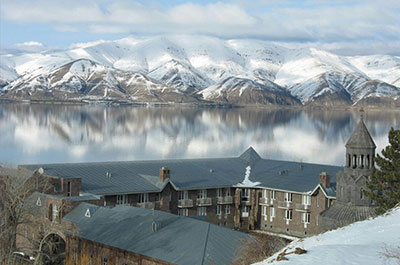Assessing Business Environment
The environment in which organizations operate is becoming so complex, variable and even confused that managers find it more and more difficult to identify significant information and monitor changes that should be reflected incorporate strategy. In this case, we refer to the need for systematic “PESTLE” analysis – a convenient shorthand for the areas that such an analysis needs to examine:
-The Political issues;
-The Economic issues;
-The Social issues;
-The Technological issues;
-The Legal issues;
-The Environmental issues
Here again, our management consultants can be of great help, especially taking into account the fast changing environment for doing business in Armenia and abroad. Some clients may need guidance in order to become more aware of the business environment and so realize that ongoing or forecasted environmental changes can have far-reaching consequences for their businesses. Other clients may be aware of the scope and depth of environmental changes, but lacking the skills and resources needed to collect necessary information and draw the right conclusions from its analysis. They find it difficult to determine what information is relevant, or may be relevant in the future.
Avenue Consulting Group provides services to clientsin matters of corporate strategy which focus on environmental information and analysis. In addition, we also use DESTEP analysis to help clients to devise systems and procedures in which environmental analysis is internalized to become a standard part of the strategic management system. DESTEP is demographic, economic, social, technological, ecological and political analysis, a broad analysis of macro factors that may impinge upon an organization’s business and operations.
Feasibility Study
The feasibility study focuses on helping our clients to answer the essential question of “should we proceed with the proposed business idea?” All activities of the study are directed toward helping answer to this question.
Avenue Consulting Group use feasibility studies in many ways but primarily focus on proposed business ventures. Entrepreneurs with a business idea should conduct a feasibility study to determine the viability of their idea before proceeding with the development of a business. Determining early that a business idea will not work saves time, money and heartache later. This fact highlightss the need of highly professional investment consulting in Armenia and abroad.
We say the business venture is viable when it promises to generate adequate cash-flow and profits, withstands the risks, remains viable in the long-term and meet the goals of the founders. The venture can be
-A start-up business,
-The purchase of an existing business,
-An expansion of current business operations or
-A new enterprise for an existing business.
Detail outline of the Feasibility Study is provided to give the Clients guidance on how to proceed with the study and what to include. Also, the detailed outline of the business feasibility study shows how to Use and when to do a Feasibility Study helping our Clients through the process.
Evaluate Alternatives
A feasibility study is usually conducted after initiators have discussed a series of business ideas or scenarios. The feasibility study helps to “frame” and “flesh-out” specific business scenarios so they can be studied in-depth. During this process the number of business alternatives under consideration is usually quickly reduced.
During the feasibility process the Client may examine a variety of ways of organizing the business and positioning the product or service in the marketplace. It is similar to an exploratory journey and the Client may take several paths before reaching the desired destination.
Pre-Feasibility Study
A pre-feasibility study may be conducted first to help the Client to sort out relevant scenarios. Before proceeding with a full-blown feasibility study, it is necessary to do some pre-feasibility analysis. If the proposed business idea is not feasible, it will save time and money. If the findings lead to proceed with the feasibility study, the work may have resolved some basic issues. We may help the Client with the pre-feasibility study, but the Client should be involved in the process, too. This is an opportunity for the Client to understand the issues of business development.
Market Assessment
Also, a market assessment may be conducted that will help the Client to determine the viability of a proposed product in the marketplace. The market assessment will help to identify opportunities in a market or market segment. If no opportunities are found, there may be no reason to proceed with a feasibility study. If opportunities are found, the market assessment can give focus and direction to the construction of business scenarios to investigate in the feasibility study. A market assessment will provide much of the information for the marketing feasibility section of the feasibility study.
Results and Conclusions
The conclusions of the feasibility study should outline in depth the various scenarios examined and the implications, strengths and weaknesses of each. The project initiators need to learn the feasibility study and challenge its underlying assumptions. Overall, the feasibility study should conclude to the best opportunity to invest in Armenia or overseas.
Industry and Competitor Analysis
A competitive advantage is a key dimension of survival and success in environments where organizations must compete with each other. This advantage is not a trick that can last a few months (e.g. a smart advertising campaign), but an inherent capacity to sustain superior performance on a long-term basis. The study for such advantage must therefore start with a systematic analysis of the industry and sector in which the client operates, and of the competitive forces at play.
THIS IS WHERE WE CAN START HELPING THE CLIENT.
Much of the most important development in strategic thinking in the past 20years has been in concepts and models that facilitate this kind of analysis.
–The “five forces” model proposed by Michael Porter identifies five key areas that management needs to understand: (1) the competitive structure within the industry/segment itself; (2) the threat of new entrants; (3) the threat of substitute products or technologies; (4) the power of suppliers; and (5) the power of customers.
-Kenichi Ohmae suggests “key success factors” on the basis of which the business unit should compare itself with its competitors.
-Another of Michael Porter’s concepts, the “value chain”, assists in determining where in the enterprise’s operating cycle these key factors are to be found.
Products and market positions can be brought into better perspective by using product/market life-cycle models. None of these models claims to describe reality for any one particular company: rather, they are an aid to thinking about reality. The package of these consulting tools Avenue Consulting Group uses can be most helpful in examining whether the client business does indeed enjoy any competitive advantage, or in developing a strategy for achieving one. We can draw the client’s attention to the ways in which organizations regarded as excellent achieved and maintained their competitive advantage. Our Consultants, being experienced in various fields of strategic consulting in Armenia, can point out certain factors that tend to be characteristic of all firms that possess such an advantage (for example, priority attention paid to the clients’ needs and satisfaction, and to the quality of products and services). But above all, We can help the client to think honestly about the industry’s characteristics, the keys to success, and just how the client’s enterprise matches up to the competition in these key areas.
Our Consultants can help the Client to choose among the alternatives that are available to it, bearing in mind the real capacities of the technical and production staff, production facilities, marketing networks and business experience.
Assessing Business Environment
The environment in which organizations operate is becoming so complex, variable and even confused that managers find it more and more difficult to identify significant information and monitor changes that should be reflected incorporate strategy. In this case, we refer to the need for systematic “PESTLE” analysis – a convenient shorthand for the areas that such an analysis needs to examine:
-The Political issues;
-The Economic issues;
-The Social issues;
-The Technological issues;
-The Legal issues;
-The Environmental issues
Here again, our management consultants can be of great help, especially taking into account the fast changing environment for doing business in Armenia and abroad. Some clients may need guidance in order to become more aware of the business environment and so realize that ongoing or forecasted environmental changes can have far-reaching consequences for their businesses. Other clients may be aware of the scope and depth of environmental changes, but lacking the skills and resources needed to collect necessary information and draw the right conclusions from its analysis. They find it difficult to determine what information is relevant, or may be relevant in the future.
Avenue Consulting Group provides services to clientsin matters of corporate strategy which focus on environmental information and analysis. In addition, we also use DESTEP analysis to help clients to devise systems and procedures in which environmental analysis is internalized to become a standard part of the strategic management system. DESTEP is demographic, economic, social, technological, ecological and political analysis, a broad analysis of macro factors that may impinge upon an organization’s business and operations.
Feasibility Study
The feasibility study focuses on helping our clients to answer the essential question of “should we proceed with the proposed business idea?” All activities of the study are directed toward helping answer to this question.
Avenue Consulting Group use feasibility studies in many ways but primarily focus on proposed business ventures. Entrepreneurs with a business idea should conduct a feasibility study to determine the viability of their idea before proceeding with the development of a business. Determining early that a business idea will not work saves time, money and heartache later. This fact highlightss the need of highly professional investment consulting in Armenia and abroad.
We say the business venture is viable when it promises to generate adequate cash-flow and profits, withstands the risks, remains viable in the long-term and meet the goals of the founders. The venture can be
-A start-up business,
-The purchase of an existing business,
-An expansion of current business operations or
-A new enterprise for an existing business.
Detail outline of the Feasibility Study is provided to give the Clients guidance on how to proceed with the study and what to include. Also, the detailed outline of the business feasibility study shows how to Use and when to do a Feasibility Study helping our Clients through the process.
Evaluate Alternatives
A feasibility study is usually conducted after initiators have discussed a series of business ideas or scenarios. The feasibility study helps to “frame” and “flesh-out” specific business scenarios so they can be studied in-depth. During this process the number of business alternatives under consideration is usually quickly reduced.
During the feasibility process the Client may examine a variety of ways of organizing the business and positioning the product or service in the marketplace. It is similar to an exploratory journey and the Client may take several paths before reaching the desired destination.
Pre-Feasibility Study
A pre-feasibility study may be conducted first to help the Client to sort out relevant scenarios. Before proceeding with a full-blown feasibility study, it is necessary to do some pre-feasibility analysis. If the proposed business idea is not feasible, it will save time and money. If the findings lead to proceed with the feasibility study, the work may have resolved some basic issues. We may help the Client with the pre-feasibility study, but the Client should be involved in the process, too. This is an opportunity for the Client to understand the issues of business development.
Market Assessment
Also, a market assessment may be conducted that will help the Client to determine the viability of a proposed product in the marketplace. The market assessment will help to identify opportunities in a market or market segment. If no opportunities are found, there may be no reason to proceed with a feasibility study. If opportunities are found, the market assessment can give focus and direction to the construction of business scenarios to investigate in the feasibility study. A market assessment will provide much of the information for the marketing feasibility section of the feasibility study.
Results and Conclusions
The conclusions of the feasibility study should outline in depth the various scenarios examined and the implications, strengths and weaknesses of each. The project initiators need to learn the feasibility study and challenge its underlying assumptions. Overall, the feasibility study should conclude to the best opportunity to invest in Armenia or overseas.
Industry and Competitor Analysis
A competitive advantage is a key dimension of survival and success in environments where organizations must compete with each other. This advantage is not a trick that can last a few months (e.g. a smart advertising campaign), but an inherent capacity to sustain superior performance on a long-term basis. The study for such advantage must therefore start with a systematic analysis of the industry and sector in which the client operates, and of the competitive forces at play.
THIS IS WHERE WE CAN START HELPING THE CLIENT.
Much of the most important development in strategic thinking in the past 20years has been in concepts and models that facilitate this kind of analysis.
–The “five forces” model proposed by Michael Porter identifies five key areas that management needs to understand: (1) the competitive structure within the industry/segment itself; (2) the threat of new entrants; (3) the threat of substitute products or technologies; (4) the power of suppliers; and (5) the power of customers.
-Kenichi Ohmae suggests “key success factors” on the basis of which the business unit should compare itself with its competitors.
-Another of Michael Porter’s concepts, the “value chain”, assists in determining where in the enterprise’s operating cycle these key factors are to be found.
Products and market positions can be brought into better perspective by using product/market life-cycle models. None of these models claims to describe reality for any one particular company: rather, they are an aid to thinking about reality. The package of these consulting tools Avenue Consulting Group uses can be most helpful in examining whether the client business does indeed enjoy any competitive advantage, or in developing a strategy for achieving one. We can draw the client’s attention to the ways in which organizations regarded as excellent achieved and maintained their competitive advantage. Our Consultants, being experienced in various fields of strategic consulting in Armenia, can point out certain factors that tend to be characteristic of all firms that possess such an advantage (for example, priority attention paid to the clients’ needs and satisfaction, and to the quality of products and services). But above all, We can help the client to think honestly about the industry’s characteristics, the keys to success, and just how the client’s enterprise matches up to the competition in these key areas.
Our Consultants can help the Client to choose among the alternatives that are available to it, bearing in mind the real capacities of the technical and production staff, production facilities, marketing networks and business experience.
NEWS
Contact Us















